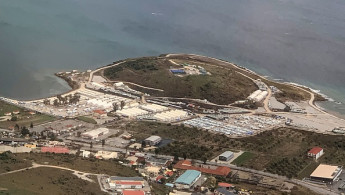Greek government has cut off food access to thousands of migrants, monitor says
The Greek government is leaving thousands denied asylum seekers and recognised refugees unable to access food and other basic means of subsistence, the Euro-Med Human Rights Monitor warned on Tuesday.
On 17 May, the Greek government announced that it would only provide food in the Mavrovouni Closed Controlled Access Centre on Lesvos to those seeking asylum. Greek authorities said recognised refugees and those denied asylum or refugee status, including the most vulnerable, would no longer be provided with food.
With no time to prepare and with very limited options to procure food, many in the centre are now at immediate risk of food insecurity, the Euro-Med Monitor said in its statement Tuesday.
Many of those migrants who exist outside the asylum system or have been denied asylum or refugee status do not have the legal right to work, trapping them in a limbo that now includes hunger.
Politics of 'discrimination' fuelling crisis
"As those whose asylum applications have been rejected are unable to benefit from any state aid and, without papers, are also not allowed to work regularly, the decision to deny them access to food and water effectively places them outside the system in complete invisibility," the Euro-Med Monitor statement said.
"There, they become easy prey to violent abuse and are in danger of recruitment by criminal organisations that exploit their struggle to survive," the statement added.
The statement points out that this is not the first time that migrants, refugees and asylum seekers have been plunged into a food crisis in Greece.
In 2021, 60% of all mainland camp residents faced food insecurity, while in December of last year, a series of cuts to state-subsidised help for the Greek government led to overcrowding of camps that meant a widespread lack of access to food and water.
Greece is fomenting a hunger crisis for denied asylum seekers & recognised refugees with its policy choices, leaving thousands unable to access food & other basic means of subsistence
— Euro-Med Monitor (@EuroMedHR) July 19, 2023
With no warning or time to prepare, these individuals are at immediate risk of food insecurity. pic.twitter.com/zS15V5x1Tt
Euro-Med blamed the anti-migrant ideology of Greece’s government and in Europe in general for the crisis.
Michela Pugliese, a legal researcher with the NGO, said: "The problem is not that there is not enough food around but that Greece is consciously removing access to available food for these people, contributing to social exclusion and discrimination, and only for political reasons."





 Follow the Middle East's top stories in English at The New Arab on Google News
Follow the Middle East's top stories in English at The New Arab on Google News
![The UAE is widely suspected of arming the RSF militia [Getty]](/sites/default/files/styles/image_330x185/public/2024-11/GettyImages-472529908.jpg?h=69f2b9d0&itok=Yauw3YTG)
![Netanyahu furiously denounced the ICC [Getty]](/sites/default/files/styles/image_330x185/public/2024-11/GettyImages-2169352575.jpg?h=199d8c1f&itok=-vRiruf5)
![Both Hamas and the Palestinian Authority welcomed the ICC arrest warrants [Getty]](/sites/default/files/styles/image_330x185/public/2024-11/GettyImages-2178351173.jpg?h=199d8c1f&itok=TV858iVg)